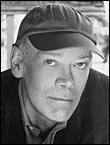Book Feature: Jonathan Raban Kicks off Critical Condition
In the first installment of “Condition Critical,” Bill Marx speaks with the author best known for his wryly written non-fiction books.
By Bill Marx

Welcome to the first installment of “Condition Critical.” This podcast (no longer available) kicks off the first in an ambitious effort to create intelligent and passionate cultural coverage online. To do so we need your help — we crave your ideas and suggestions about what to cover and how it should be covered. For those who have questions, or want to find out how they can contribute material to the podcast, contact me at info at artsfuse.org (substituting “@” for “at” of course).
This week, I talk to writer Jonathan Raban. He was born in England in 1942, but for the past 17 years he has lived in Seattle, Washington. He is best known for wryly written non-fiction books that seamlessly merge disparate genres: travel writing, autobiography, political commentary, and fiction. In the past, Raban has written perceptively about the Middle East (“Arabia” 1979), sailing around the coast of England (“Coasting” 1986), and journeying down the Mississippi (“Old Glory” 1981). His latest book, the novel “Surveillance,” (Pantheon) is a dark vision of a post 9/11 world dominated by spies and counter-spies spreading suspicion into every aspect of our lives. Set in Seattle, the somewhat schematic yarn sees America as paralyzed in an apocalyptic panic centering on the omiprescence of ambiguity – who can tell, or who can you trust to tell, the difference between the real and the fake?
I spoke to Raban when he came to Boston on tour for his book in late February. While reading “Surveillance” I realized that it had been awhile, almost a decade in fact, since I had picked up any of this writer’s work. So I am reading “Coasting” now – it is a nimbly entertaining narrative, comic with overtones of melancholy, that presents a self-deprecating Raban gaining his sea legs as he sails solo around England. The fracas in the Falklands erupted (or is that fizzled?) during the writer’s voyage, which adds a resonant political dimension as he describes the country gearing itself up for war. Next I am going to take a look at his 2003 novel, “Waxwings,” which deals with the psychic damage exerted by the dotcom boom.
The Raban volume I have the most affection for is “For Love & Money,” one of the best books about the trials and tribulations of the writing life I have come across, a superb mix of literary criticism, confession, and travel writing. The reviews in this collection, (published in 1989) are crackerjack, especially pieces on the British writersV.S. Pritchett, Evelyn Waugh, and the Victorian chronicler of the poor, Henry Mayhew. Raban’s fascination with the self’s various fissures and dualities results in brilliant examinations of the individual writer’s various reactions to the social pressures exerted on himself and others. His gushy enthusiasm for the untrammeled self of American writers such as Saul Bellow and Eudora Welty breaks Raban’s rule that “the reviewer is there to write, not to melt away from the book in tongue-tied wonder,” but the author’s tangy exploration of English realism makes up for his crush on the New World, which has, given his recent novel, obviously cooled down over the years.
Raban’s talent as a critic is matched by his daunting powers as a memorist, humorist, and travel writer. Sections about writing television plays, working for the late Ian Hamilton’s “New Review” magazine, and buying a boat in anticipation of a sea voyage are as crisp, compact, and imaginative as short stories. A thoughtful essay on English literature’s failure to writer charitably and perceptively about characters who choose to live outside of the conventional family subtly draws on Raban’s presentation of himself as a somewhat ornery outsider. Throughout the book, Raban argues that the line between fiction and nonfiction should be invisible – this is a theme that runs throughout his books, which explore the fertile creative relationship between memory and the imagination.

I can’t add your feed to Feedburner. How I do this?